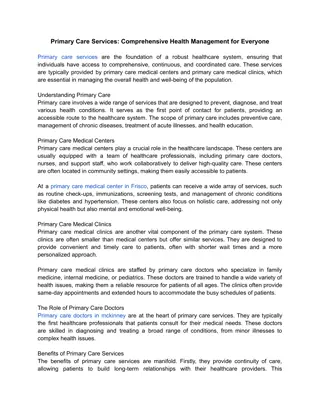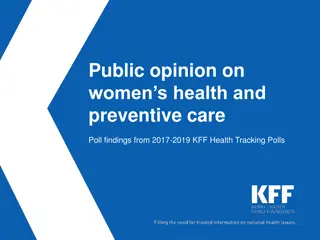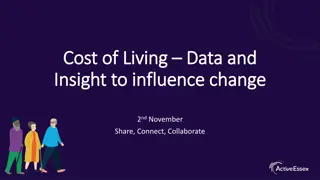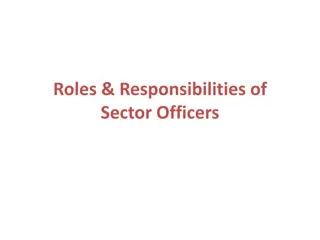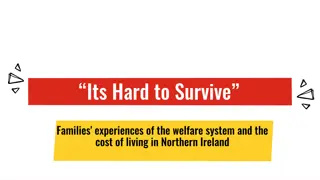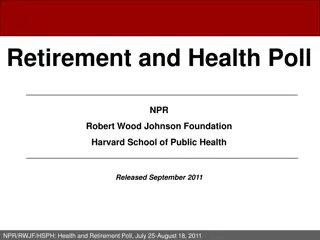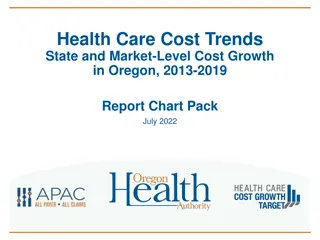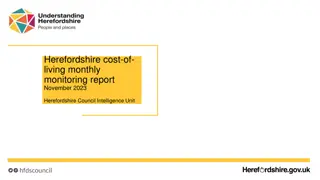Impact of Rising Cost of Living on Health and Care Services: January 2023 Poll Findings
Charities and campaign groups warn of a cost of living crisis impacting health services. A recent poll highlights increased avoidance of health services due to financial constraints, underlining the struggle faced by many. Findings indicate a rise in people avoiding NHS appointments, dentist visits, medication purchases, and prescription pickups due to the financial burden. Wave-based polling tracks these trends over recent months to inform decision-makers on necessary support measures.
Download Presentation

Please find below an Image/Link to download the presentation.
The content on the website is provided AS IS for your information and personal use only. It may not be sold, licensed, or shared on other websites without obtaining consent from the author. Download presentation by click this link. If you encounter any issues during the download, it is possible that the publisher has removed the file from their server.
E N D
Presentation Transcript
Health and the cost of living Key messages from our polling, January 2023
Context Over the last year, many charities and campaign groups have warned that millions of people are struggling with the cost of living crisis. We have heard from our Healthwatch network about the impact the rising cost of living is having on people. To understand the scale and nature of this impact, especially the effect on people s health and their use of health and care services, we commissioned a nationally representative (of England) poll. We are running this poll in four waves across winter to track the changing impact of the rising cost of living over time. We will use the findings to help inform health and care decision-makers about the steps they may need to take to improve support for people. Our research is principally focussed on finding out the following: What impacts do people anticipate the rising cost of living having on them; What impacts are people already experiencing, including how they are changing their behaviour to cope with the rising cost of living; and If, and how, the rising cost of living affects how people interact with health and care services. Health and the cost of living January 2023 2
Next steps When will the polling take place? Wave 1 ran 19 to 25 October Wave 2 ran 5 to 9 December Wave 3 will run in late January Wave 4 will run in early March Health and the cost of living January 2023 3
What impact has there been on the use of health and care services? We asked people: Thinking now specifically about your use of health and care services. Over the last month have you done any of the following? Our polls show that the numbers of people changing their use of health and care services increased between October and December In December, 11% of respondents said they had avoided attending an NHS appointment because they couldn t afford to travel to it, up from 6% in October. 15% said they have avoided going to the dentist because of the cost of check- ups/treatment, up from 12% in October. 11% said they have avoided booking an NHS appointment because they couldn t afford the associated costs (e.g., access to the internet or the cost of the phone call to book), up from 7% in October. 10% said they have avoided buying over the counter medication they normally rely on, up from 7% in October Finally, in December 10% of respondents said they have avoided taking up one or more NHS prescriptions because of the cost, up from 6% in October. Health and the cost of living January 2023 4
What impact has there been on the use of health and care services? Use of health and care services in October (wave 1) vs December (wave 2) 16% 14% 12% 10% 8% 15% 12% 6% 11% 11% 10% 10% 4% 7% 7% 6% 6% 2% 0% Avoided attending appointment due to travel costs Avoided the dentist Avoided booking appointment due to associated costs Avoided over the counter medication Avoided prescriptions Wave 1 Wave 2 Health and the cost of living January 2023 5
What changes are people making to cope with the rising cost of living? We asked people: Thinking about the current rising cost of living, how, if at all, have you changed anything in the way you live your life in order to cut back on spending? Energy use: many people are trying to adapt to increased energy bills. In December, 37% said they have not turned on the heating when they usually would, consistent with the figure of 36% in October There is a clear gender divide. 33% of male respondents said they had not turned on the heating when they usually would, compared to 42% of female respondents. In December, 29% of respondents said they have turned off or avoided using essential appliances to save energy costs, up 3% since October. Again, there is a clear gender difference. 25% of male respondents said they have done this, compared to 33% of female respondents. Health and the cost of living January 2023 6
What changes are people making to cope with the rising cost of living? We asked people: Thinking about the current rising cost of living, how, if at all, have you changed anything in the way you live your life in order to cut back on spending? Food: people are taking tough decisions on food. In December, 24% said they have bought less food because of the increased cost of it, up from 20% in October. More women are doing this than men. 27% of female respondents said they had done this, compared to 20% of male respondents. In December, 17% said they have bought less healthy food than they would usually, because of the cost of food, up from 14% in October. Slightly more female respondents, 18%, reported doing this than male respondents, 15%. In December, 15% said they have skipped meals because of the increased cost of food, up from 9% in October. The figures for female and male respondents are similar, at 14% and 15% respectively. Health and the cost of living January 2023 7
What are the impacts of the changes people are making? We asked people: Thinking specifically about any life changes you have made to cut back on costs/keep up with the rising cost of living, what impact have they had on the following areas of your life? . In December, 39% of respondents said the changes they have made have negatively impacted their mental health. This is consistent with October, when the figure was 40%. Within that figure, there has been some change. In October 11% said the impact on their mental health had been very negative , in December this increased to 13%. There is also a clear gender difference. In December 35% of male respondents said the changes they have made have had a negative impact on their mental health, noticeably lower than figure of 43% for female respondents. You can see the other areas of life we asked about in the final slide. These did not show such a clear picture as mental health. We will track if this changes over time. Health and the cost of living January 2023 8
What health impacts have there been from the rising cost of living? We asked people: Thinking about your health, in the last two months, has your mental and physical health got better or worse? In October, 29% of respondents said their physical health had got worse in the last two months. By December, this had risen to 35% of respondents. There is a slight gender difference within that figure of 35%. For female respondents, the figure is 37%, compared to 34% for male respondents. There is a similar picture in mental health, though with a smaller increase. In October 29% of respondents said their mental health had got worse in the last two months, increasing to 32% in December. The gender divide in mental heath is clearer. Whilst in December 29% of male respondents said their mental health had got worse in the past two months, for female respondents the figure is 35%. Health and the cost of living January 2023 9
What health impacts have there been from the rising cost of living? Respondents reporting their mental/physical health as getting a little or a lot worse in the last two months, December 40% 35% 30% 25% 20% 37% 35% 34% 29% 15% 10% 5% 0% Mental health Physical health Male Female Health and the cost of living January 2023 10
Conclusions The cost of living is impacting people s use of health and care services, with the numbers of people being impacted increasing markedly between October and December. People are avoiding attending appointments, avoiding booking appointments, avoiding buying over the counter medications, and avoiding taking up prescriptions. People are making changes to cope with the rising cost of living, including reducing their energy expenditure and making tough choices on food. There is already evidence of the negative impacts of these changes, with a large minority saying the changes they have made have negatively impacted their mental health. This is particularly the case with women. On both physical and mental health, more people in December thought their health had got worse than October. With all of these findings, it is important to remember that both our polls took place before very cold winter weather arrived, so the full extent of the impact of higher energy bills may not yet be visible. We will be monitoring how the trends presented here progress over the next waves of our poll. Health and the cost of living January 2023 11
Questions Full details of the questions we asked to generate this data Thinking now specifically about your use of health and care services. Over the last month have you done any of the following? I have avoided going to the dentist because of the cost of check-ups/treatment I have cut down on or stopped support on non-surgical private health services (e.g. physiotherapy, counselling) I have avoided booking an NHS appointment because I couldn t afford the associated costs (e.g. access to the internet, or the cost of the phone call to book the appointment) I have avoided attending an NHS appointment because I couldn t afford to travel to the appointment (e.g. petrol for my car, public transport costs) I have avoided seeking help from the NHS because I couldn t take time off work (e.g. because I was worried I would lose pay, or might be sacked) I have changed, cut down on or stopped support from paid for carers (e.g. people coming into my home to help me with preparing meals or washing and dressing) I have used a social care service that I would not have done otherwise, because of the cost of living I have avoided buying over the counter medication I normally rely on I have avoided taking up one or more NHS prescription because of the cost I have used a used a health service that I would not have done otherwise, because of the cost of living I have cut down on the use of medical equipment at home because of the running costs (e.g. ventilators, dialysis) None of these Prefer not to say Health and the cost of living January 2023 12
Questions Full details of the questions we asked to generate this data Thinking about the current rising cost of living, how, if at all, have you changed anything in the way you live your life in order to cut back on spending? I have put on more clothes than usual to stay warm I have not turned on the heating when I usually would I have turned off or avoided using essential appliances to save energy costs (e.g. not used the oven to cook) I have cut down or stopped social/entertainment expenditure (e.g. meeting up with friends, subscribing to streaming services) I have bought less food because of the increased cost of food I have gone to bed earlier than I usually would to save energy costs I have bought less healthy food than I would usually, because of the cost of food I have skipped meals because of the increased cost of food I have cut down or stopped things that help me stay fit and healthy (e.g. cancelled gym membership, stopped taking vitamins) I have/am considering trying to find cheaper accommodation because I have concerns about being able to meet my mortgage/rent payments I have cancelled my broadband or mobile phone contract, or moved to a contract with more limited internet access or phone minutes, because of the cost I have not been able to get to work because of the cost of fuel or public transport. I have been made homeless because I could not meet my mortgage/rent payments Other N/A haven t changed anything/nothing in particular Prefer not to say Health and the cost of living January 2023 13
Questions Full details of the questions we asked to generate this data Thinking specifically about any life changes you have made to cut back on costs/keep up with the rising cost of living, what impact have they had on the following areas of your life? Respondents rated the following on the scale: Very positive impact ; Somewhat positive impact ; Neither positive nor negative impact ; Somewhat negative impact ; Very negative impact ; Not applicable ; Prefer not to say Your ability to work (e.g. your fitness levels) Your ability to care for others Your mental health (e.g. your level of stress and anxiety) Your ability to manage an existing long-term condition (e.g. diabetes) Your feelings of physical pain Your ability to maintain relationships with friends and family Prefer not to say Health and the cost of living January 2023 14
Questions Full details of the questions we asked to generate this data Thinking about your health, in the last two months, has your mental and physical health got better or worse? Respondents answered separately for physical and mental health, on the following scale. Got a lot worse Got a bit worse Neither got better nor worse (stayed the same) Got a bit better Got a lot better Prefer not to say *All figures, unless otherwise stated, are from OnePoll. Total sample size was 2000 adults. Fieldwork was undertaken between 19 to 25 October 2022 and between 5 and 9 December. The survey was carried out online. The figures are representative of all England adults (aged 18+). Health and the cost of living January 2023 15
For more information Healthwatch England National Customer Service Centre Citygate Gallowgate Newcastle upon Tyne NE1 4PA www.healthwatch.co.uk t: 03000 683 000 e: enquiries@healthwatch.co.uk @HealthwatchE Facebook.com/HealthwatchE









